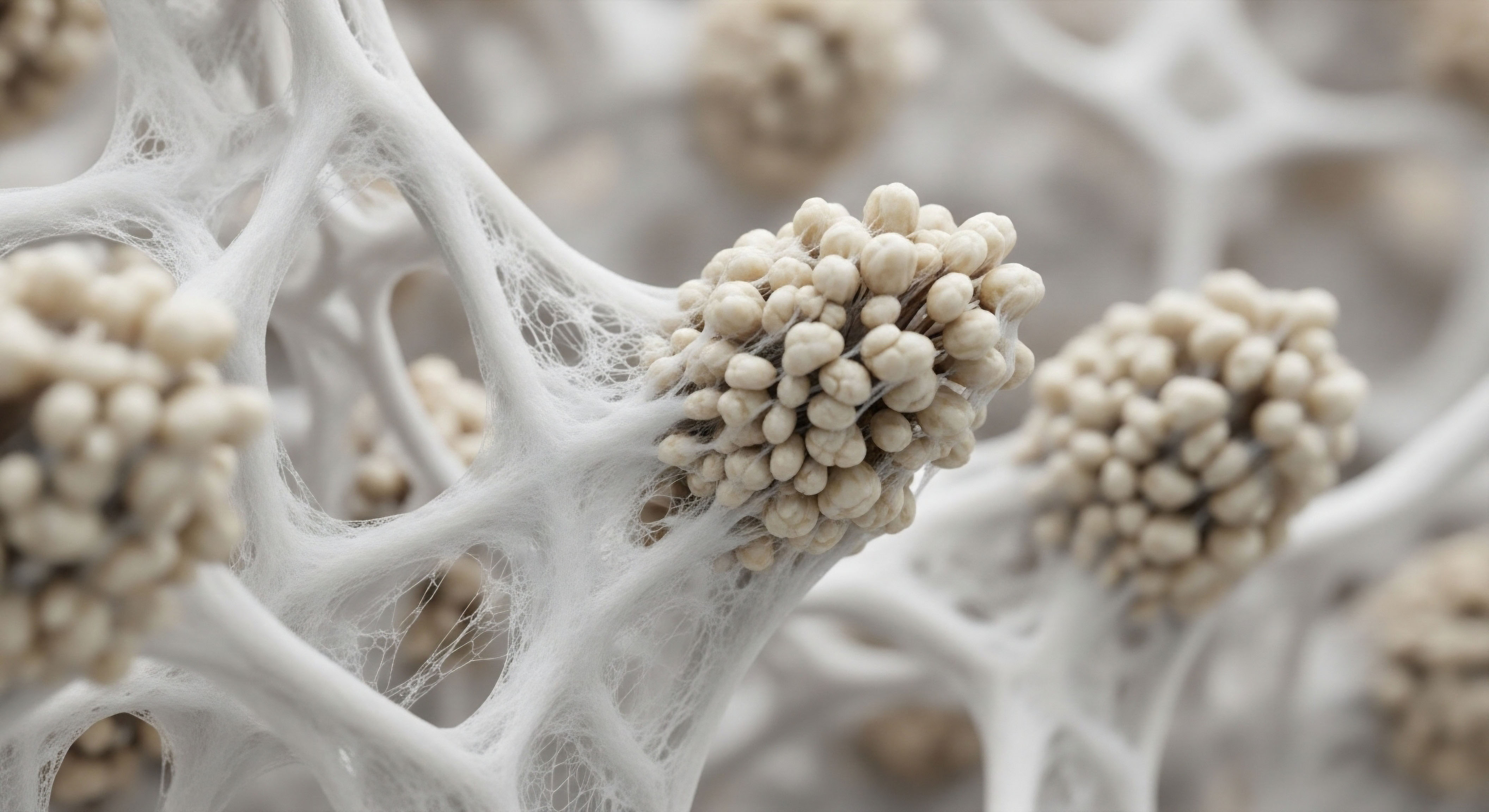

Fundamentals
Have you ever found yourself grappling with a persistent mental fog, a subtle yet pervasive sense that your cognitive sharpness has diminished? Perhaps you experience moments of forgetfulness, a struggle to maintain focus, or a general feeling that your vitality is not what it once was.
These experiences, often dismissed as simply “getting older” or “being stressed,” are deeply personal and can significantly impact daily life. They are not merely subjective sensations; they often signal deeper shifts within your biological systems, particularly concerning hormonal balance and metabolic function. Understanding these internal dialogues your body conducts is the first step toward reclaiming clarity and vigor.
Your brain, the command center of your entire being, relies on a delicate symphony of chemical messengers to operate optimally. Among these messengers are peptides, short chains of amino acids that act as signaling molecules. They play instrumental roles in a vast array of physiological processes, including neurogenesis, synaptic plasticity, mood regulation, and cognitive performance.
When we consider the efficacy of these vital compounds, whether naturally produced or therapeutically administered, it becomes clear that their actions are not isolated. They are profoundly influenced by the very environment within your body, an environment shaped by your daily choices.
Consider the intricate dance between your endocrine system and your nervous system. Hormones, such as testosterone, estrogen, and progesterone, are not solely responsible for reproductive health; they exert widespread effects on brain structure and function. Fluctuations or deficiencies in these endocrine signals can directly impact neurotransmitter synthesis, receptor sensitivity, and even the structural integrity of neural networks.
When these foundational hormonal systems are out of alignment, the ability of peptides to exert their beneficial effects on brain health can be significantly compromised.
The concept of personalized wellness protocols acknowledges that each individual’s biological landscape is unique. Your genetic predispositions, your past health history, and your current lifestyle practices all contribute to this distinctive internal environment. Therefore, a blanket approach to supporting brain health or enhancing peptide efficacy often falls short.
A truly effective strategy requires a precise understanding of your own biological systems, allowing for targeted interventions that address root causes rather than merely masking symptoms. This journey of self-discovery, guided by clinical insight, empowers you to recalibrate your internal systems and restore optimal function.
Understanding your body’s internal chemical communications is essential for reclaiming cognitive vitality.

What Are Peptides and Their Brain Functions?
Peptides are ubiquitous throughout the human body, acting as sophisticated communicators between cells and systems. In the context of brain health, their roles are diverse and critical. Some peptides function as neurotransmitters, directly transmitting signals between neurons. Others act as neuromodulators, fine-tuning the activity of neural circuits. Still others serve as neurotrophic factors, supporting the growth, survival, and differentiation of neurons. This broad spectrum of activity underscores their importance in maintaining cognitive resilience and mental well-being.
For instance, certain growth hormone-releasing peptides (GHRPs) stimulate the pituitary gland to secrete growth hormone (GH). While GH is widely recognized for its role in tissue repair and metabolism, its influence on brain health is equally compelling. Growth hormone receptors are present in various brain regions, including the hippocampus, a structure vital for memory and learning. Optimized GH levels, often supported by peptide therapy, can contribute to improved cognitive function and neuroprotection.

The Endocrine System’s Influence on Brain Peptides
The endocrine system, a network of glands that produce and secrete hormones, acts as a master regulator of bodily functions, including those within the brain. Hormones and peptides are inextricably linked in this regulatory dance. For example, the hypothalamic-pituitary-gonadal (HPG) axis, which governs sex hormone production, directly influences the expression and activity of various neuropeptides involved in mood, cognition, and stress response.
When this axis is dysregulated, perhaps due to age-related decline or chronic stress, the brain’s capacity to utilize peptides effectively can be diminished.
Consider the impact of testosterone and estrogen. These steroid hormones are not just involved in reproductive processes; they are potent neurosteroids. Testosterone contributes to cognitive function, spatial memory, and mood stability in both men and women. Estrogen plays a significant role in neuronal survival, synaptic plasticity, and memory consolidation.
When levels of these hormones are suboptimal, the brain’s environment becomes less conducive to the optimal functioning of endogenous peptides and can reduce the responsiveness to exogenous peptide therapies. This highlights the systemic nature of health, where no single component operates in isolation.


Intermediate
Moving beyond the foundational understanding of peptides and their brain functions, we now consider the practical applications of clinical protocols designed to optimize hormonal health and, by extension, enhance peptide efficacy for cognitive vitality.
These protocols are not merely about symptom management; they represent a strategic recalibration of your body’s internal communication systems, aiming to restore a state of physiological balance that supports optimal brain function. The ‘how’ and ‘why’ behind these therapies are rooted in a deep understanding of endocrine feedback loops and cellular signaling pathways.
When addressing concerns related to cognitive decline, mood shifts, or reduced mental acuity, a comprehensive assessment often reveals underlying hormonal imbalances. Targeted interventions, such as hormonal optimization protocols and specific peptide therapies, are then employed to create a more favorable internal environment. This approach recognizes that the brain does not operate in a vacuum; its performance is intimately tied to the broader metabolic and endocrine landscape of the body.
Strategic hormonal and peptide therapies can recalibrate internal systems for improved brain function.

Targeted Hormonal Optimization Protocols
Hormone replacement therapy (HRT) applications are tailored to distinct patient groups, addressing specific needs related to age-related decline or hormonal dysregulation. These protocols aim to restore physiological hormone levels, thereby creating a more receptive environment for the brain’s intrinsic peptide systems and any administered peptide therapies.

Testosterone Replacement Therapy for Men
For men experiencing symptoms of low testosterone, often termed andropause, a standard protocol involves weekly intramuscular injections of Testosterone Cypionate. This exogenous testosterone helps to replenish circulating levels, which can positively influence mood, energy, and cognitive function. However, maintaining the delicate balance of the endocrine system requires additional considerations.
- Gonadorelin ∞ Administered via subcutaneous injections, typically twice weekly, Gonadorelin helps to maintain the natural production of testosterone within the testes and preserve fertility. It acts on the pituitary gland, stimulating the release of luteinizing hormone (LH) and follicle-stimulating hormone (FSH), which are crucial for testicular function.
- Anastrozole ∞ This oral tablet, taken twice weekly, serves to mitigate potential side effects by blocking the conversion of testosterone into estrogen. While some estrogen is beneficial for men, excessive levels can lead to undesirable outcomes, including cognitive blunting.
- Enclomiphene ∞ In certain cases, Enclomiphene may be included to further support LH and FSH levels, promoting endogenous testosterone production and maintaining testicular size.
By optimizing testosterone levels and managing its metabolic pathways, these protocols contribute to a neurochemical environment where brain peptides can function more effectively, potentially improving memory, focus, and overall mental clarity.

Testosterone Replacement Therapy for Women
Women, particularly those in pre-menopausal, peri-menopausal, or post-menopausal stages, can also experience symptoms related to suboptimal testosterone levels, such as irregular cycles, mood changes, hot flashes, and reduced libido. Protocols for women are carefully titrated to their unique physiological needs.
- Testosterone Cypionate ∞ Typically administered in very low doses, around 10 ∞ 20 units (0.1 ∞ 0.2ml) weekly via subcutaneous injection, to gently restore levels without inducing masculinizing effects.
- Progesterone ∞ Prescribed based on menopausal status, progesterone plays a vital role in balancing estrogen and testosterone, supporting mood, sleep, and cognitive function.
- Pellet Therapy ∞ Long-acting testosterone pellets offer a convenient alternative, providing sustained release of the hormone. Anastrozole may be used in conjunction when appropriate to manage estrogen levels.
Restoring hormonal equilibrium in women creates a more stable foundation for brain health, potentially enhancing the responsiveness of neural pathways to peptide signaling.

Growth Hormone Peptide Therapy
Growth hormone peptide therapy targets the body’s natural growth hormone axis, aiming to optimize GH levels without directly administering synthetic growth hormone. This approach leverages the body’s own regulatory mechanisms, often resulting in a more physiological release pattern. These peptides are particularly relevant for active adults and athletes seeking anti-aging benefits, muscle gain, fat loss, and improved sleep, all of which indirectly support brain health.
The brain itself is a significant consumer of growth hormone, and its receptors are widely distributed in areas critical for learning and memory. By stimulating the pulsatile release of endogenous GH, these peptides can contribute to neurogenesis, synaptic repair, and the maintenance of cognitive function.
Commonly utilized peptides in this category include:
- Sermorelin ∞ A growth hormone-releasing hormone (GHRH) analog that stimulates the pituitary gland to secrete GH. It promotes a more natural, pulsatile release of GH, mimicking the body’s physiological rhythm.
- Ipamorelin / CJC-1295 ∞ Ipamorelin is a selective growth hormone secretagogue, meaning it stimulates GH release without significantly impacting other hormones like cortisol or prolactin. CJC-1295 is a GHRH analog that provides a sustained release of GH. Often combined, they offer a powerful synergistic effect on GH secretion.
- Tesamorelin ∞ Another GHRH analog, Tesamorelin has shown specific benefits in reducing visceral fat and improving cognitive function in certain populations.
- Hexarelin ∞ A potent GHRP that stimulates GH release and has also been studied for its cardioprotective effects.
- MK-677 ∞ An oral growth hormone secretagogue that increases GH and IGF-1 levels by mimicking the action of ghrelin.
The effectiveness of these peptides is not solely dependent on their direct action; it is significantly influenced by the overall metabolic health of the individual. For instance, insulin sensitivity, nutrient availability, and sleep quality all play a role in the pituitary’s responsiveness to these stimulating peptides.

Other Targeted Peptides for Systemic Support
Beyond growth hormone secretagogues, other peptides offer specific benefits that indirectly or directly support brain health by addressing systemic issues.
- PT-141 (Bremelanotide) ∞ Primarily known for its role in sexual health, PT-141 acts on melanocortin receptors in the central nervous system to influence sexual desire and arousal. While its direct impact on broad cognitive function is not its primary indication, improved sexual health can significantly enhance overall well-being and reduce stress, which in turn supports brain health.
- Pentadeca Arginate (PDA) ∞ This peptide is gaining recognition for its potential in tissue repair, healing, and inflammation modulation. Chronic inflammation, particularly neuroinflammation, is a known contributor to cognitive decline. By supporting cellular repair and reducing systemic inflammation, PDA can create a more conducive environment for neural health and function.
The interplay between these peptides and the body’s broader physiological state underscores the importance of a holistic approach. Lifestyle factors, which we will discuss in depth, are not merely adjuncts to these therapies; they are foundational elements that determine the ultimate success and efficacy of any peptide or hormonal intervention.
| Peptide Category | Primary Mechanism of Action | Key Benefits (General) | Relevance to Brain Health |
|---|---|---|---|
| Growth Hormone-Releasing Peptides (GHRPs) | Stimulate pituitary GH secretion | Muscle gain, fat loss, improved sleep, tissue repair | Neurogenesis, synaptic plasticity, cognitive function |
| Melanocortin Receptor Agonists (e.g. PT-141) | Activate central melanocortin receptors | Sexual desire and arousal | Indirectly via improved well-being, stress reduction |
| Tissue Repair/Anti-inflammatory Peptides (e.g. PDA) | Modulate inflammation, support cellular repair | Reduced inflammation, accelerated healing | Mitigation of neuroinflammation, neuroprotection |


Academic
The question of how lifestyle factors influence peptide efficacy for brain health demands a deep dive into the intricate molecular and cellular mechanisms that govern neuroendocrine function. This exploration moves beyond simple correlations, seeking to understand the precise biochemical pathways through which daily habits can either enhance or diminish the therapeutic potential of both endogenous and exogenous peptides.
Our focus here is on the systems-biology perspective, analyzing the dynamic interplay between various biological axes, metabolic pathways, and neurotransmitter systems that collectively shape brain vitality.
The brain is an organ of extraordinary metabolic demand, highly sensitive to fluctuations in nutrient availability, oxidative stress, and inflammatory signals. Peptides, acting as sophisticated signaling molecules, operate within this complex milieu. Their ability to bind to receptors, activate downstream signaling cascades, and ultimately exert their neurotrophic or neuromodulatory effects is not a static process. It is continuously modulated by the physiological state of the organism, a state heavily influenced by lifestyle choices.
Lifestyle choices profoundly shape the brain’s environment, directly impacting peptide signaling and efficacy.

Metabolic Health and Peptide Responsiveness
One of the most critical lifestyle determinants of peptide efficacy is metabolic health. Conditions such as insulin resistance, chronic hyperglycemia, and dyslipidemia create a systemic inflammatory environment that can directly impair neuronal function and reduce the sensitivity of peptide receptors. The brain’s reliance on glucose as its primary fuel source means that disruptions in glucose metabolism have immediate and far-reaching consequences for cognitive performance.
Consider the impact on growth hormone-releasing peptides (GHRPs) like Sermorelin or Ipamorelin. Their primary action is to stimulate the pituitary gland to release growth hormone (GH). However, chronic hyperglycemia and elevated insulin levels can blunt the pituitary’s responsiveness to these signals.
Research indicates that insulin resistance can reduce the pulsatile secretion of GH, even in the presence of secretagogues, by altering hypothalamic regulation and pituitary sensitivity. This suggests that a diet high in refined carbohydrates and sugars, leading to persistent insulin spikes, could directly undermine the therapeutic benefits of GHRPs aimed at cognitive enhancement.

The Gut-Brain Axis and Peptide Bioavailability
The gut-brain axis represents a bidirectional communication network between the enteric nervous system and the central nervous system. This axis is heavily influenced by the composition of the gut microbiome, which produces a vast array of metabolites, including short-chain fatty acids (SCFAs) and neurotransmitter precursors.
A dysbiotic gut, characterized by an imbalance of beneficial and harmful bacteria, can lead to increased intestinal permeability, or “leaky gut,” allowing inflammatory molecules to enter the bloodstream and potentially cross the blood-brain barrier.
This systemic inflammation can compromise the integrity of the blood-brain barrier, affecting the transport and bioavailability of peptides. Furthermore, the gut microbiome itself can metabolize certain peptides or influence the expression of peptide receptors in the gut and brain.
For instance, the efficacy of orally administered peptides, or even the systemic effects of injectable peptides, could be modulated by the health of the gut lining and the microbial ecosystem within. A diet rich in diverse fiber and fermented foods supports a healthy microbiome, thereby indirectly enhancing the systemic environment for peptide function.

Stress, Cortisol, and Neurotransmitter Balance
Chronic psychological stress activates the hypothalamic-pituitary-adrenal (HPA) axis, leading to sustained elevation of cortisol. While cortisol is essential for stress response, its chronic elevation is neurotoxic. Prolonged exposure to high cortisol levels can lead to hippocampal atrophy, impaired neurogenesis, and reduced synaptic plasticity, all of which contribute to cognitive decline.
The HPA axis also interacts intimately with peptide systems. For example, stress can alter the expression of neuropeptides involved in mood regulation, such as neuropeptide Y (NPY) and corticotropin-releasing hormone (CRH). The efficacy of peptides aimed at improving mood or reducing anxiety, such as certain melanocortin analogs, could be significantly diminished in an environment dominated by chronic stress and high cortisol.
Lifestyle interventions like mindfulness, adequate sleep, and regular physical activity are crucial for modulating the HPA axis and creating a more balanced neurochemical landscape where peptides can exert their intended effects.

Sleep Architecture and Growth Hormone Pulsatility
Sleep is not merely a period of rest; it is a highly active state crucial for brain repair, memory consolidation, and hormonal regulation. The majority of growth hormone (GH) secretion occurs during deep, slow-wave sleep. Disruptions to sleep architecture, whether due to insomnia, sleep apnea, or irregular sleep schedules, can significantly impair the pulsatile release of endogenous GH.
When considering the administration of GHRPs like Sermorelin or Ipamorelin, their efficacy is predicated on the body’s ability to respond with a robust GH pulse. If sleep quality is consistently poor, the pituitary gland’s sensitivity to these secretagogues may be reduced, or the overall nocturnal GH output may remain suboptimal despite therapy. This highlights a critical interplay ∞ while peptides can support GH levels, foundational sleep hygiene is indispensable for maximizing their therapeutic impact on brain health.
| Lifestyle Factor | Biological Mechanism of Influence | Impact on Peptide Efficacy |
|---|---|---|
| Nutrition (Balanced, Whole Foods) | Regulates insulin sensitivity, reduces inflammation, supports gut microbiome health. | Enhances receptor sensitivity, improves bioavailability, reduces systemic interference. |
| Sleep Quality (Deep, Restorative) | Optimizes endogenous GH pulsatility, supports brain repair and detoxification. | Maximizes responsiveness to GHRPs, improves overall neural environment for peptide action. |
| Stress Management (Mindfulness, Relaxation) | Modulates HPA axis, reduces chronic cortisol, balances neurotransmitters. | Prevents neurotoxicity, improves receptor function, supports mood-related peptide effects. |
| Physical Activity (Regular Exercise) | Increases neurotrophic factors (e.g. BDNF), improves cerebral blood flow, enhances metabolic health. | Creates a more neuroplastic environment, potentially increasing peptide uptake and utilization. |

Neurotrophic Factors and Exercise
Regular physical activity is a potent modulator of brain health, primarily through its ability to increase the production of neurotrophic factors, such as Brain-Derived Neurotrophic Factor (BDNF). BDNF plays a crucial role in neuronal survival, growth, and synaptic plasticity, essentially acting as a fertilizer for brain cells. Exercise also improves cerebral blood flow, delivering essential nutrients and oxygen to brain tissue, and reduces systemic inflammation.
The presence of higher levels of endogenous neurotrophic factors, stimulated by exercise, can create a more receptive environment for peptides that aim to support neurogenesis or repair. For example, if a peptide is designed to promote neuronal growth, an exercise-primed brain with elevated BDNF levels might exhibit a more robust response to that peptide. This synergistic relationship underscores that therapeutic interventions are most effective when integrated into a comprehensive wellness strategy.
Ultimately, the efficacy of peptides for brain health is not a standalone phenomenon. It is deeply intertwined with the foundational health of your metabolic, endocrine, and nervous systems. Lifestyle factors ∞ nutrition, sleep, stress management, and physical activity ∞ are not merely supportive; they are integral components that determine the ultimate success of any protocol aimed at optimizing cognitive function and reclaiming mental vitality. A truly personalized approach recognizes these interdependencies, allowing for targeted interventions that honor the complexity of human biology.

References
- Veldhuis, Johannes D. et al. “Insulin and glucose regulate pulsatile growth hormone secretion in humans.” Journal of Clinical Endocrinology & Metabolism, vol. 72, no. 1, 1991, pp. 102-109.
- Sapolsky, Robert M. “Stress and the brain ∞ emerging concepts in neuroendocrinology.” Dialogues in Clinical Neuroscience, vol. 7, no. 1, 2005, pp. 11-23.
- Van Cauter, Eve, et al. “Sleep and the epidemic of obesity in children and adults.” European Journal of Endocrinology, vol. 151, no. 1, 2004, pp. 77-87.
- McEwen, Bruce S. “Stress, adaptation, and disease ∞ Allostasis and allostatic overload.” Annals of the New York Academy of Sciences, vol. 840, no. 1, 1998, pp. 33-44.
- Kramer, Arthur F. and Kirk I. Erickson. “Capitalizing on cortical plasticity ∞ the influence of physical activity on cognition.” Trends in Cognitive Sciences, vol. 11, no. 8, 2007, pp. 342-348.
- Molitch, Mark E. “Growth hormone deficiency in adults.” Endocrine Reviews, vol. 22, no. 1, 2001, pp. 1-24.
- Gottfried, Sara. The Hormone Cure ∞ Reclaim Your Body, Balance Your Hormones, and Feel Like New. HarperOne, 2013.
- Hyman, Mark. The UltraMind Solution ∞ Fix Your Broken Brain by Healing Your Body First. Scribner, 2009.

Reflection
As you consider the intricate connections between your daily habits and the sophisticated chemistry within your brain, a deeper understanding of your own biological systems begins to form. This knowledge is not merely academic; it is a powerful tool for personal agency. The journey toward reclaiming vitality and optimal function is a deeply personal one, unique to your individual physiology and lived experience.
The insights shared here serve as a starting point, a framework for comprehending the profound impact of lifestyle on your hormonal landscape and, consequently, on the efficacy of peptides for brain health. Your path forward involves a continuous process of observation, adjustment, and informed decision-making.
By recognizing the interconnectedness of your body’s systems, you are better equipped to make choices that truly support your well-being. This ongoing dialogue with your own biology holds the key to unlocking your full potential.



